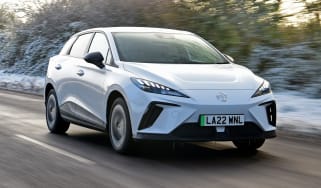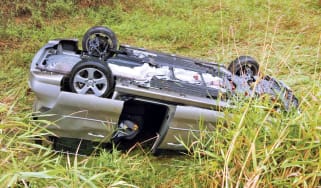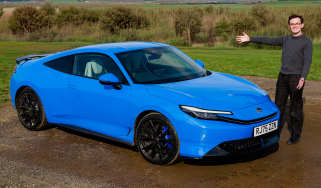Used electric cars: should you buy one?
With more used electric cars available than ever before and bargains to be had, here are our top tips to consider before splashing the cash
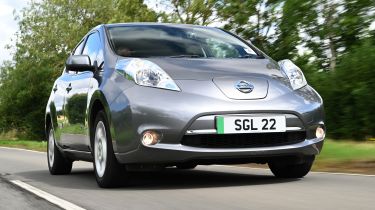
As technology advances, battery ranges increase and the range of choice available grows, used electric cars are becoming ever more appealing to motorists. Before you buy a used EV, however, there are a few things you should consider.
The electric car market is firmly on the up as more and more people decide that an EV could suit them. The re-introduction of government grants in the form of the Electric Car Grant, tax incentives for company car users and the ZEV mandate forcing manufacturers to sell more EVs are all boosting new car sales and increasing the flow of older models appearing on the used car market.
According to Zapmap, the total number of electric cars on UK roads tipped over the 1.6 million mark in 2025; throw in almost 900,000 plug-in hybrids registered and it’s clear buyers have an appetite for low-emissions vehicles with plugs.
Our guide is here to help you decide if a used electric car is the right fit for you. We’ll also explore EV-specific issues to be aware of, including the important questions of electric car battery life and depreciation.
If you decide that you’re ready to take the plunge, then there are lots of used electric cars available via the Auto Express Buy a Car service. We can even help you sell your old car, too.
Should you buy a used electric car?
Unfortunately there is no straightforward ‘yes’ or ‘no’ answer to this question as it depends entirely on your personal circumstances, how you use your car, how often and how far you drive, as well as if you have access to off-street parking.
Many drivers will have questions and concerns around an electric car's suitability as a replacement if they are making the switch from a pure petrol or diesel-powered car. However, with the wide breadth of choice on the used car market and the improving charging infrastructure, the decision to switch from petrol/ diesel to electric is easier than it has ever been - and it’s only likely to become more so.
What you should consider when choosing a used electric car
If you are deciding whether a used electric car if suitable for you, consider the following:
EV range
Range anxiety can be a major concern for electric car newcomers, the fact is that most day-to-day driving consists of shorter-distance trips so a used electric car should suit most.
In most everyday driving on a mix of roads, the vast majority of electric cars will be just as suitable as an internal combustion alternative. Many will prefer the smoothness, strong acceleration and refinement that comes with owning an EV.
It’s also worth considering that even on medium-length trips there are plenty of options available for you to recharge your car.
If you are the sort of driver who supplements shorter daily trips with occasional longer-distance motorway drives, an electric car can still make a lot of sense. While the longest range electric cars can easily crack 350 miles on a single charge, even those with more modest capacities can be great on longer trips, you just need to do a little planning.
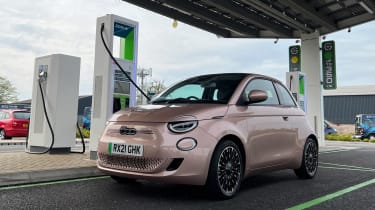
Electric car charging
Electric cars are easiest, cheapest and most convenient when paired with off-street parking like a driveway or garage.
If you get an EV home wallbox installed, you can schedule your car to charge overnight and set off the next morning with a full ‘tank’. Many electricity providers offer EV charging tariffs with reduced unit prices during off-peak hours, meaning it is much cheaper to charge an EV at home than in public.
Public EV charging network
The UK’s infrastructure is continuing to expand at a rapid pace, with over 84,000 electric car chargepoints now available across the UK.
Those with on-street parking will have to rely more on the public charger network, but this is much less scary than it sounds: most larger towns and cities in the UK now have slower chargers at the very least, with rapid chargers also becoming more common. Supermarkets, gyms, service stations, train stations, airports, hospitals, large car parks and many other common destinations are now likely to have chargers available.
If you want more information about the public charging network, as well as the costs of charging an EV at a quick charger, we have a dedicated page which goes into more detail.
EV efficiency
It’s important not to get too hung up on range, though. Larger batteries take longer to fully charge than smaller ones and are also heavier, which can make cars fitted with them less efficient. In some ways, buying an electric car based purely on its maximum range is like buying a petrol car according to its fuel tank size, a statistic that’s only really relevant when tackling a serious road trip.
Instead, consider comparing used electric cars based on efficiency figures. Usually given in the format of miles per kilowatt hour, it’s the equivalent of comparing miles per gallon figures for conventional cars. The higher the number, the more efficient the car – and the less money you’ll need to spend on charging. Range then becomes a secondary consideration, perhaps based on your usual longer-distance driving habits.
EV depreciation
There’s no doubt that electric car depreciation has been a major problem for those who bought new EVs a few years ago. Technology has advanced at such a rate that even electric cars of two or three years old can look a lot less appealing next to the latest new models. Together with the high prices charged for the first electric cars that emerged onto the UK market, when competition and pressure from the ZEV mandate for manufacturers to sell EVs were less, this has caused big depreciation on some models.
Of course, this is great news for used car buyers who can now pick-up these older EV models at a knockdown price. Whether today’s new cars will be saddled with the same scale of depreciation is unclear. They will be vulnerable to further advances in technology but with market forces and Government grants forcing new car prices down, the market seems likely to stabilise.
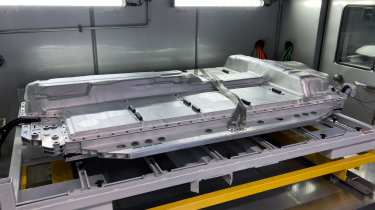
Used electric car battery health and warranties
While electric cars have fewer moving parts than their internal combustion engined counterparts, the biggest concern most drivers will have is surrounding the health of the batteries and electric motors.
Much like batteries found in electronic devices like phones, electric car batteries degrade over time and can do so faster or slower in certain circumstances.
Advice varies between manufacturers but typically an electric car that has been mostly charged via slower sources like a 7.4kW home wallbox charger, will enjoy better battery health a few years down the line than if a rapid DC charger was used regularly.
It is possible as a second-hand buyer to find out what the health of the battery is. Some electric cars will display battery health information somewhere in their infotainment system, so it’s worth checking here first. You might need to consult the car's manual first.
If you can’t find the battery health information then you can keep an eye on range and battery percentage while out on a test drive and watch out for irregularities. It is possible to also run a diagnostic check at a dealer or specialist, something that’s worth doing for ultimate peace of mind.
Replacing an electric car battery is more often than not an extremely expensive process and therefore best avoided. Thankfully, manufacturers tend to acknowledge this with generous electric car battery warranties that can outlast the standard warranty for the rest of the car.
Eight-year warranties can be found on many models, although some later cars have a shorter five-year term. Either way, this should give you added peace of mind that the battery will keep its charge. Some even stipulate the acceptable capacity after eight years (often around 70 per cent), and will replace or refurbish the battery if it falls below this level.
Common used electric car problems
Overall, an electric car should be easier to assess and have fewer potential issues than petrol or diesel models. There's no clutch to wear out, no engine oil or spark plugs, and no worry about a cambelt that hasn't been changed on time. But just because there are fewer moving parts, there are still niggles which you could come across.
EVs are usually well equipped as standard, so check that the infotainment and any extras like heated seats are functioning. Be sure to check if the car has received the latest over-the-air software and car updates where applicable, and whether any recalls have been issued. You can check this online using the car’s registration number on the UK government website.
Most auxiliary systems like infotainment and air-conditioning are operated via a small traditional 12V car battery, so it’s important to make sure this is in good health, too.
Many electric cars will have been used in town, so keep an eye out for wheel damage that may extend to the suspension behind it. Some EVs also incorporate exotic materials like carbon fibre in their construction, so make sure bodywork is in sound order too to avoid bills down the road.
The quiet and refined nature of many electric cars means interior rattles and any wind noise can be more noticeable, so listen out for suspect noises and make sure window seals are healthy.
Electric cars are famously torquey and generally quick off the line as a result. This can cause havoc with tyres so check wear and condition carefully before buying, paying particular attention to the driven wheels.
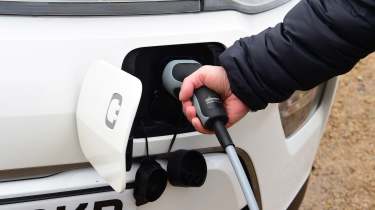
Used electric car market growth
The rapid pace of EV development and a constant flow of shiny new models – paired with (sometimes overblown) questions over battery life and more general economic issues – means electric cars have suffered steep depreciation in recent years. It’s a concern for those buying brand new electric cars with their own money but great news for those looking for a used electric car bargain.
For example, after three years or 36,000-miles of ownership, a large chunk of a car's depreciation has already taken place. A three-year old Vauxhall Corsa Electric is expected to retain 33 per cent of its value, compared to 39 - 53 per cent of the value for a petrol-powered Vauxhall Corsa. You can buy a three-year old Vauxhall Corsa Electric from just under £10,500 via the Auto Express Buy a Car service, while a petrol Corsa will start from around £10,300 in a similar spec.
In the second quarter of 2025, a total of 68,721 used electric cars were sold and this is largely the result of ex-company cars hitting the market in big numbers as a knock-on effect of strong business and fleet tax incentives on new models. There’s more choice than ever before, so a used electric car hunt is no longer limited to old examples of pioneering models like the Nissan Leaf and Renault Zoe.
Used electric cars haven’t been around for as long as their petrol and diesel counterparts so it’s understandable that many people feel daunted when looking to buy one. The good news is that while EVs bring their own challenges and snagging points, the removal of an internal combustion engine from the mix does simplify things.
Ready to make the switch? These are the best electric cars to buy...
Your electric car questions answered
- Electric car FAQ
- Should i buy an electric car?
- What’s the best way to buy an electric car?
- Is a hybrid, plug-in hybrid or electric car right for me?
- Can i get a plug-in car grant?
- How is electric car range calculated?
- How much do electric cars cost to charge?
- How much do electric cars cost to run?
- How long do electric car batteries last?
- What happens to old electric car batteries?
- Should i get a heat pump on my electric car?
- What are fast charging and rapid charging?
- Should i get a home electric car charger?
- Can i tow with an electric car?
- Is wireless electric car charging the future?
- What’s the history of the electric car?





